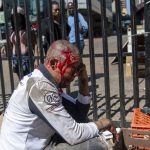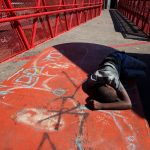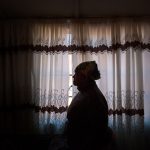Keagan Dolly challenges SA athletes to use their voices for good
The Bafana Bafana forward spoke passionately about the need for footballers to speak out against the country’s social ills and lead by example as athletes and ambassadors.
Author:
7 September 2019

It was appropriate that Keagan Dolly, 26, was standing in the centre of the mecca of South African football, Orlando Stadium, when he made a passionate plea to his colleagues towards the end of a dark week for the country.
That darkness filtered down to football, prolonging Dolly’s wait to don the Bafana Bafana jersey in a competitive match. He last played for Bafana against Libya in August last year. He missed out on the qualifiers that followed and the Africa Cup of Nations (Afcon) in Egypt because of a groin injury.
He was in line to make his long-awaited return on Saturday 7 September, but Zambia and then Madagascar pulled out of a scheduled international friendly against Bafana because of the spate of xenophobic attacks in South Africa.
Related article:
While the country was dealing with the mobs and the backlash that followed, including retaliation attacks on South African businesses in Nigeria and Zambia, another woman was raped and killed. The silence from South Africa’s leaders was deafening while the country was burning and its women were reminded of how unsafe they are, with the brutal rape and murder of University of Cape Town student Uyinene Mrwetyana by a South African Post Office employee.
“It’s really important for us as players to speak out on the social ills affecting the country,” Dolly said. “It’s no use keeping quiet and just sitting back because it’s not affecting us directly, but as ‘role models’ and public figures we have to speak up and also encourage men to be better, show them what is happening is wrong. We have to show South African citizens that we are there for them and we support them in their struggles.”

Effects of the xenophobic attacks
Bafana players were distraught when they left Orlando Stadium on Thursday 5 September. The news of Madagascar’s withdrawal broke midway through their training session. The Malagasy Football Federation said that after “consulting several different national institutions, especially taking into account the security of the Madagascar delegation and Madagascan foreign nationals living in South Africa, it became mandatory to decline the invitation”.
The South African Football Association (Safa) hastily arranged a press conference that night to condemn the xenophobic attacks and called on the government, the business sector and student movements to do the same.
“Before we are South Africans, we are Africans. I think that in South Africa we tend to forget that,” Dolly said. “It’s really sad to see what is happening in the country, that we are still attacking foreigners, people we should call brothers.
Related article:
“This isn’t the first time that this has happened. To go through this again is sad. Hopefully we can unite and fight against xenophobia, not only that but also the killing of our women. That has been happening for far too long.
“As men and the national team players, we have to stand in solidarity with women, speak out against femicide, hold each other as men accountable and lead by example and not just in words.”
The pride of Westbury
Doubling up as an athlete and an ambassador is nothing new for Dolly. He is something of a philanthropist and a beacon of hope for the gang-ridden suburb of Westbury in Johannesburg. The Montpellier forward was in France last year in October when his hometown was hit by a wave of protests following the death of Heather Peterson, who was caught in the crossfire during a gun battle between alleged drug dealers.
“Social media has made everything open for the world to see,” Dolly said. “I followed what was happening on Twitter. It’s hard to see a place you grew up in going through that. It’s also high time for people to intervene, because on a daily basis we lose young people in the neighbourhood. It’s high time that the police and government intervene to stop the crime that’s happening in Westbury.”
Related article:
Dolly’s speech about Westbury is peppered with passion because it holds a special place in his heart. While Bafana were slaying the Pharaohs in Egypt to reach the Afcon quarterfinals, Dolly organised a soup kitchen drive to feed more than 100 people in his hometown. If he isn’t giving back to the community in the off season, he can be found at the Steven Pienaar Community Cup organised by another son of Westbury, the former Bafana Bafana captain who inspired Dolly to follow his football dreams.
“I try to inspire youngsters, even when they are having a small kickabout in the streets,” Dolly said. “When I pass, I try to kick a few balls with them and talk to them as much as I can.
“I go to the Steve Pienaar tournament to show my presence, take pictures and sign autographs to show them that I am still a part of them and I haven’t forgotten where I come from. For youngsters, it’s important to give them that moment with you, just so that they can carry on.
“I hardly go on holiday because my family is in South Africa. I try to spend as much time as I can in Westbury and with my community.”

Leading by example
The picturesque setting of Montpellier in the south of France is a world away from the Westbury Dolly grew up in and football was integral to his survival. Pienaar, who has played in the Netherlands, Germany and England, inspired Dolly to dream beyond Westbury.
Seeing someone who grew up on the same streets as him play in the biggest football leagues in the world inspired Dolly, showing him that it was possible for him, too, to rub shoulders with footballing royalty in Europe. Like Pienaar, he started his journey at the Safa Transnet Football School of Excellence. And like the now retired 37-year-old, Dolly wants to inspire future generations from his hometown to dream beyond the gangs and the drugs that have held Westbury hostage.
“The most important thing is that when I was four years old, I decided to play football,” Dolly said. “That took my mind and attention away from the negative things that were happening. I grew up in a neighbourhood where I would see certain things a five or six-year-old shouldn’t see. Football and going to the School of Excellence took me out of that place. It kept me safe from all the bad things that were happening.”
Related article:
Westbury is calmer now than it was a year ago, during the protests. But that doesn’t mean the issues the residents marched for – visible policing and a clampdown on criminal elements – have been addressed. The reason why Dolly doesn’t forget his hometown and doesn’t stray from the straight and narrow is that criminals and drug dealers are the most visible role models for youngsters.
“The most important thing is to get leaders in the community, to be there for the youngsters, because most of the families don’t have a father figure or a leader who can talk to youngsters,” Dolly said. “As a professional footballer, it’s important to go back and share your experiences with them. Just to show them that it’s possible.
“I have been trying to show them that if Steven Pienaar can do it, if Keagan Dolly can do it, and they both come from Westbury, they can also make it. I know that it’s not easy. I have to show them that it is possible.”
Leaving a legacy in Europe
Dolly featured in all four of Montpellier’s matches at the start of this season. His time in France hasn’t been rosy on the pitch, with injuries and lack of game time holding him back. But his game has grown in the two years he has spent in Ligue 1.
“I am more mature now,” Dolly said. “I am more direct as well. I am more physical because that’s what Ligue 1 demands, to be more physical. I am much better on my decision-making. Last season was difficult and I lost my confidence. You could see with the few games I played, I didn’t feel normal.
“I always felt that I was a step behind all the other guys. With the good pre-season I had with the team, I am happy with where I am in terms of confidence and fitness. I can build on that.”
Related article:
Even though Dolly’s first two seasons in France were challenging, the thought of returning to South Africa where he would be a big fish hasn’t crossed his mind. He is prepared to fight for a long career in Europe, like his idol Pienaar, who spent 16 years abroad. Aside from personal goals, Dolly also wants to do it for the South Africans who look up to him and to create hope in his troubled hometown.
“It’s up to the individual, on how much they want it,” Dolly said. “My dream has always been to play in Europe. Nothing is going to stop that. It would be sad for me to just give up on my dreams, because when I started playing football that’s the only thing I wanted to do. It’s important to show the other players in South Africa that it’s possible, if you really want something then you must work hard to achieve it.”





